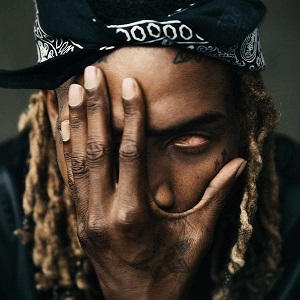It’s J Dilla’s world; we just live in it. Hip hop owes a debt the size of a small nation’s GDP to the departed Chairman Of The Boards, and the compound interest is a bitch. Who can resist the snaking soul jazz intrinsic to The Pharcyde’s classic ‘Runnin’, the austere funk backing Phife Dawg’s priapic ‘Bend Ova’ or, like, literally anything the man ever did with Common on the mic?
The crate digging beat cult that formed in Dilla’s wake treats every new archival release with awestruck reverence as if delivered on golden plates by Joseph Smith.
But nobody lives in James Dewitt Yancey’s shadow quite like Illa J, his biological brother and posthumous musical partner. With beats cobbled together from the mid-90s’ Delicious Vinyl dustbin, his 2008 solo debut Yancey Boys sounded more contemporary than it ought have. Naturally, most of the focus here and on the subsequent Sunset Blvd. with emcee Frank Nitt was on Dilla’s reanimated rhythms. To be sure, rap careers often depend more on beats than rhymes, but Illa’s reliance on archival loops kept him passed over on his own albums, some shaky ass ground to rely on in a forward-moving genre.
Intentionally or otherwise, this eponymous album attempts a course correction simply by going donut-free. Fortunately, Illa’s ambitions are matched by his scruples, choosing a conservative route that won’t lose him the fans he’s already earned. Unabashedly indebted to Dilla, production duo Potatohead People curate his instrumentals for the most part, favouring shuffling boom bap with synthy funk squiggles and pads (‘Who Got It’). Geography alone explains Illa’s Canadian connection, continuing a Detroit musical tradition that goes back generations. But whether rapping over the Kaytranada assisted jambuster ‘Strippers’ or repeatedly passing the mic to erstwhile Swollen Member Moka Only, his collaborative choices come off as curatorial, not regional.
Still, now that he’s got our undivided attention, one wonders whether Illa J has much of anything to say. After all, the current calibre of Detroit rap talent sets the bar fairly high, from Dej Loaf’s ethering realism and Big Sean’s industrial punchlines to Guilty Simpson’s robust rhyming and Quelle Chris’ thoughtful eccentrism. A traditional backpack rap romantic from head to toe, Illa works through his emotions like Q-Tip on ‘She Burned My Art’ and earnestly catcalls his way through clubland during ‘Universe’. On ‘Perfect Game’, he never struggles to maintain the bowling metaphor, easily avoiding the pitiable corniness that would befall a lesser lyricist. His adept performance on such a risky exercise suggests the Yancey rap legacy is in very good hands.
Angel Haze – Back To The Woods

Pop stardom never really suited Angel Haze, though the rapper certainly tried with the shiny sentimental glop of an eventual major label outing Dirty Gold. Now independent, their focus narrows somewhat to an area of comparable strength, that being an intimidating rap prowess. Thematically, the tone here is markedly less self-help motivational than that former incarnation, though the confidence remains. There’s a lot more anger to be found on Back To The Woods, and Haze keeps it pointed at all the appropriate targets (‘Babe Ruthless’, Impossible’). Production leans towards the dystopian, with Tk Kayembe’s bass drum bombast reigning over a near barren sonic wasteland. Admittedly, that approach suits pugnacious fare like ‘On Fire’ much more so than the R&B reachbacks of ‘The Eulogy’ and ‘Moonrise Kingdom’. Nonetheless, the improved balance between Haze’s two distinct stylistic modes on cuts like ‘Dark Places’ makes this vastly more enjoyable than their disparate debut. In an alternate universe, this might earn the rapper a Drake cosign, should Haze accept it.
Fetty Wap – Fetty Wap

By now, ‘Trap Queen’ is a part of your everyday life, an eager earworm that burrowed so intently that it counts as the plus one when you RSVP to parties. But before the song effectively turned into our collective Kuato, the coked-up love ballad belonged to Fetty Wap, a Garden State amalgam of Akon, Ja Rule, and T-Pain. Released in the wake of four consecutive hit singles, his overlong debut full-length amounts to an overdose, his crisp lugubrious trap constantly slathered with unnaturally yellow nacho slime. This stuff is cut with Splenda, which makes for a fun four minutes but a discomfiting seventy-seven. The catchphrases that made him a star become blunt objects poking against the ribs, especially all 1,738 instances of yeaaaaah baby (‘RGF Island’, ‘Trap Luv’). The uniformity of the flimsy material bruises from within. Remy Boy Monty’s ubiquity throughout smacks of a Faustian bargain, though the devil in these details remains unidentified. That said, if intended as a dry run for a solo album for Fetty’s deputy, his myriad appearances raise neither hell nor hackles.
MED, Blu & Madlib – Bad Neighbor

One of the few enduring boom bap royals, Madlib never fell out of favour even as hip hop moved further and further away from him. Another win in an already tremendous year for Greater Los Angeles, Bad Neighbor reteams the Beat Konducta with favored emcee MED as part of a trio with the consistently underrated Blu. With almost as many additional collaborators as Dr. Dre’s Compton, the album is perhaps best appreciated as a whole than in parts, though the Bernie Worrell sampling Madvillain reunion ‘Knock Knock’ makes a persuasive counterpoint. As usual, MED’s vaguely nasal flow suits these wildly funky, oft jazzy beats, and in the spirit of competition Blu represents reliably. But really, this is more tapestry than showcase, with the guests sometimes crowding the principals out. Lootpack’s DJ Romes comes through with the primo scratches on throwback ‘Streets’ while Dam Funk echoes and booms a bizarre hook for the deep spacey ‘Peroxide’. A genuine 2015 breakout talent, Anderson Paak continues his rise to stardom with ‘The Strip’.
MGK – General Admission

When Kid Rock’s unmistakable yawp hits on ‘Bad Mother Fucker’, the next sound you may hear is your own eye roll. Look, the issue with Machine Gun Kelly has never been about talent, which he undeniably has, but rather his execution. For his second full-length under Sean Combs’ bespoke wing, the Apollo kid once again spits with agility, even approaching Twista speeds when it suits him. An album artist in a music industry more dependent on singles than ever, MGK hasn’t given Bad Boy much to work with here. Try as he might, he’s just not particularly likeable as he coarsely defends himself amid the attempted baring of his soul on ‘Story Of The Stairs’, to say nothing of the crass jism imagery elsewhere. As for the record’s more tasteful and dramatized moments, ‘Gone’ and ‘Merry Go Round’ fit somewhere in the gulf between Eminem’s ‘Stan’ and Wiz Khalifa’s ‘See You Again’, yet there’s not enough hope there to float him. Furthermore, there’s something audacious about MGK repping Cleveland while dubiously comparing himself to 2Pac (‘World Series’).
Milo – So The Flies Don’t Come
First and foremost, this is poetry. And like any good chapbook, So The Flies Don’t Come benefits from close examination and repeat consumption. A rapper of sorts, Milo’s casual brilliance recalls that of King Missile’s John S. Hall, each churning turn of phrase jolting our future dead language with temporary stays of execution. On ‘Song About A Raygunn’, he speaks reverently of his Hellfyre mentor with none of the accented rancor of Hall’s old Scorsese screed. Milo comes in peace but he sees the culture war, a linguist struggling with the consequences of language. He grits his teeth over white rap fans’ negligent abuse of the n-word (‘Souvenir’) and tries desperately to answer an offscreen Twitter inquisitor (‘Yomilo’). Beatwise, producer Kenny Segal leans towards jazz abstractions, full of billowy smoke instead of the more typical boom bap dust. The hot crackle of ‘An Encyclopedia’ is more artisanal than old school, a delicate presentation for Milo to unload his references upon. Everyone’s outdone themselves this time.
White Boiz – Neighborhood Wonderful

Known mainly for their work in respective and respected groups, these two independent Los Angeles rap talents pare down to a duo for this fantastic full length album, which opens with a spirited sampled debate involving Sheik Way-El of the Moorish Science Temple of America. Neighborhood Wonderful is peppered with contention if not outright marinated in it, addressing black identity politics in America by way of frequent provocative interstitials. Amid this meta discussion of Afrocentrism as well as the definition of blackness and whiteness, emcee Krondon and producer Shafiq Husayn present a highly lyrical album they rather accurately describe as Farrakhan meets Flying Lotus. The incredibly cool beats aren’t quite as far out as FlyLo’s, but they’re not entirely of our world either (‘Erotica Exotica’, ‘GUN’). Krondon grounds these cosmic sounds with earthly concerns, delivering his own state of the union on ‘Learn Tho’ and dropping finger-pointed knowledge on ‘Mary’s Son’.
BONUS: One Hitters:
Apollo Brown – Grandeur What could’ve been a production victory lap for the Mello Music maestro instead spotlights a finite universe of dope emcees for whom lyricism matters as much as it ever did.
Iglooghost – Chinese Nü Yr Brainfeeder rightfully snatched up this forward-thinking teenaged producer whose mirthfully manic synthesis of garage, hip hop, footwork, and as-yet undefined (sub)genres makes him a beatmaker to watch.
Run The Jewels – Meow The Jewels A comedic conceit that was never all that funny in the first place gets its very own standalone special, with all of us as the cat butt of the joke.
Mr. Muthafuckin eXquire – Live Forever No longer bound to the major label beast, the New New York enigma seeks to regain his footing in the aftermath – and occasionally finds it.
Young Dro – Da Reality Show One of Atlanta’s most reliable, the seasoned Grand Hustle artist’s latest ticks all the right boxes and then, strangely, clocks out early.


